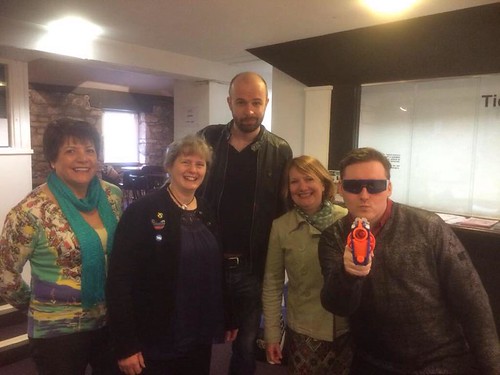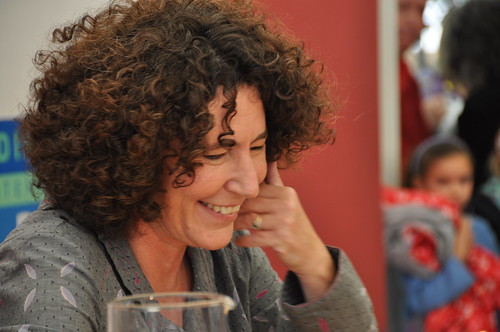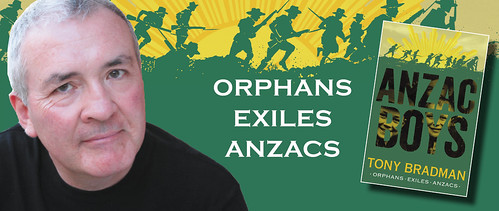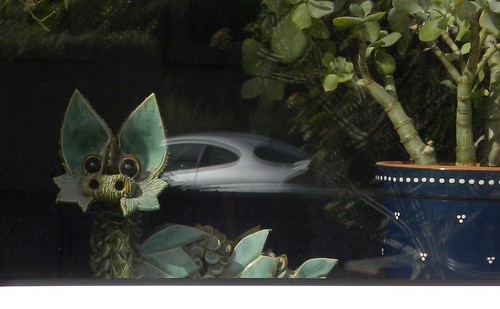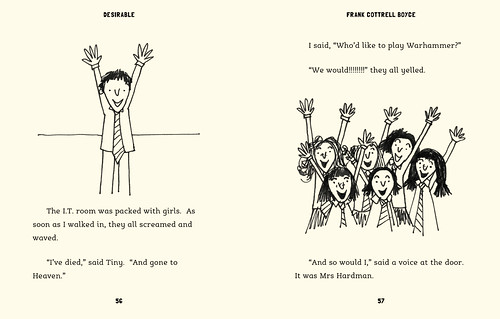
Yesterday saw the long awaited birth of Kirkland Ciccone’s first ever Scottish YA book festival Yay! YA+, and I really appreciate his thoughtfulness in arranging it for the day on which I celebrated my first year in Scotland. Kirkie had lined up ten teen authors, 200 teens and one tardis-like venue in the shape of the Cumbernauld Theatre. In Cumbernauld. He also arranged for the lovely people of Scotia Books to come and sell books, and between you and me, they not only had the good taste to like my sense of humour, but their mobile shop was the best I’ve seen.
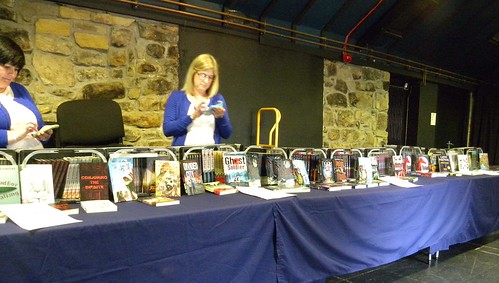
Once we were all in, Kirkland explained how some authors would ‘be taken out’ and split up into tiny pieces. Yeah. I don’t think he meant that literally. He wanted to say that six of the authors would be ensconced in their own little rooms (=bars and subterranean dressing rooms), where smaller groups of the audience would come to hear them read from their books, or talk about their writing, or anything else they might want to do. Ten times. Eek!
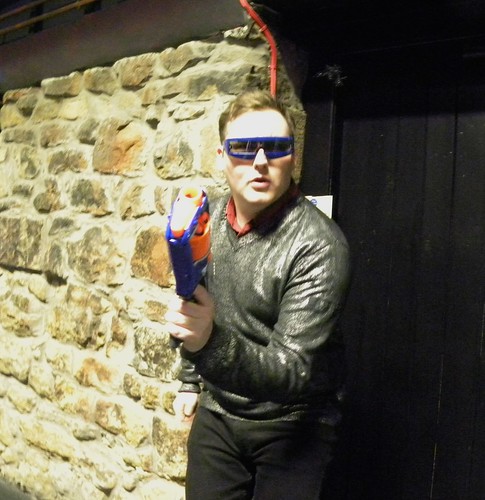
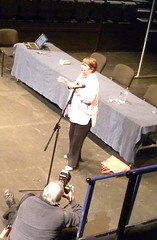
Meanwhile, Cathy MacPhail, Theresa Breslin and Barry Hutchison stayed in the main theatre and each had 25 minutes in which to charm the half of the audience left behind, which they did with real style. Twice. Multi award-winner Cathy started by sharing the trailer to her film Another Me, based on a nightmare she once had. She can see a story in anything (perhaps because she’s from Greenock, where you know everyone), and Cathy is surprised she writes such scary books, when she really is such a nice person.

Theresa brought her gasmask, which looked quite uncomfortable to wear, and some shrapnel from WWI. She reminisced about travelling to America a month after September 11th, and hearing he same words then, that soldiers used a 90 years earlier to describe why they went to war. Some things never change. She read a tense bit from Remembrance, before telling us how good it is to write YA for teens, as they will read everything, with no set ideas of what a book has to be.
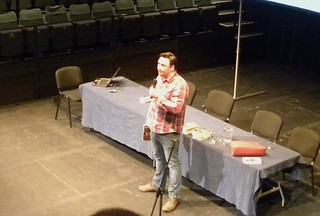
Last but not least, Barry Hutchison talked about his fears, so it was back to his perennially entertaining tales of ‘Death and Squirrels’ and his childhood concern whether the dead squirrel was ‘proper dead’ or might come back and attack the young Barry. I can listen to his tale of weeing in the kitchen sink as many times as he will tell it. Or about his friend Derek. Barry read from The 13th Horseman, which must have made half the children want to buy a copy.

There was lunch – with cupcakes and fruit – and signings and even some time for hanging out. Keith Charters turned up, and admitted to a life-long ignorance of sharpies. That’s not why he came, but, still. I contemplated stealing Kirkie’s sharpies-filled lunchbox, but didn’t.

After the eating I aligned myself with half the group from Cumbernauld Academy for my rounds of the nether regions of the theatre, and they were both lovely and polite as well as interested in books. Although, I joined them after their session with Linda Strachan – in the bar – which unfortunately meant I actually missed Linda’s seven minute show, as I was sitting out the empty slot with Alex Nye (one school was missing). And you’ll think I have something against Linda, since she is the only one who does not appear in any of my – frankly substandard – photos (photographer had better things to do…).
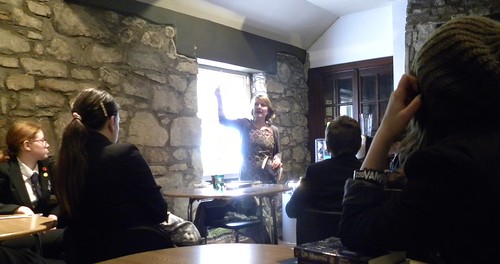
Anyway, Alex spoke about her cool books, Chill and Shiver, featuring snow and ghosts, before we went to join Matt Cartney who not only sat in a warm bar, but who had been to the Sahara. Admittedly, he had been to Hardangervidda as well. His Danny Lansing Adventures (Matt loves adventures!) are set in sand, and snow, and wherever else Matt might find inspiration.

Lari Don read from Mind Blind, which was her first non-fantasy, for older readers. She had been troubled by not being able to solve problems with magic. Lari is very good with school children. We then found Roy Gill in one of the dressing rooms, and the poor man was only allowed five minutes with us, so raced like crazy through his werewolves and a reading from his latest book.
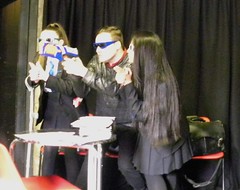
We finished in another dressing room where Victoria Campbell had brought her Viking weapons. Just imagine, small basement room full of young teenagers and some – possibly not totally lethal – weapons. She dressed one volunteer in a spiky helmet but didn’t let go of either the Dane Axe or the sword. Victoria asked what the best thing so far had been, and my group reckoned it was the selfies! Apparently some of her Viking interest comes from a short period living in Sweden (good taste). Before we left her, there was an almighty scream from – I would guess – Roy’s dressing room.

Ever the optimist, Kirkie had scheduled a panel session at the end (a full 20 minutes!), chaired by Keith. Unsurprisingly, the authors had different opinions on nearly everything. But the questions were good. Very good. This was one fine audience.
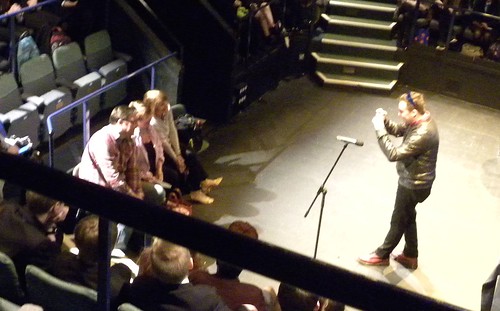
Theresa brought out a gift for Kirkie, which might have been a chocolate boot. And while the panel wound things up, he and some of the others hastily got ready to run off to Edinburgh, where they had an(other) event to go to. All good things come in twos.

The very lovely Barry Hutchison offered to remove me from the premises, on his way home to Fort William, which meant I was able to actually leave Cumbernauld – something that had worried me considerably earlier in the week. He set me down outside the newsagent’s after some nice conversation, and a secret.
My verdict of the day is that if we can only get Kirkland to speak less loudly in places, this worked really quite well. Might let him repeat it, if he can find more dark corners in which to stash Scotland’s finest.
(I found the photo below on facebook, and because it has Linda Strachan in it, I decided to borrow the picture, a little.)
